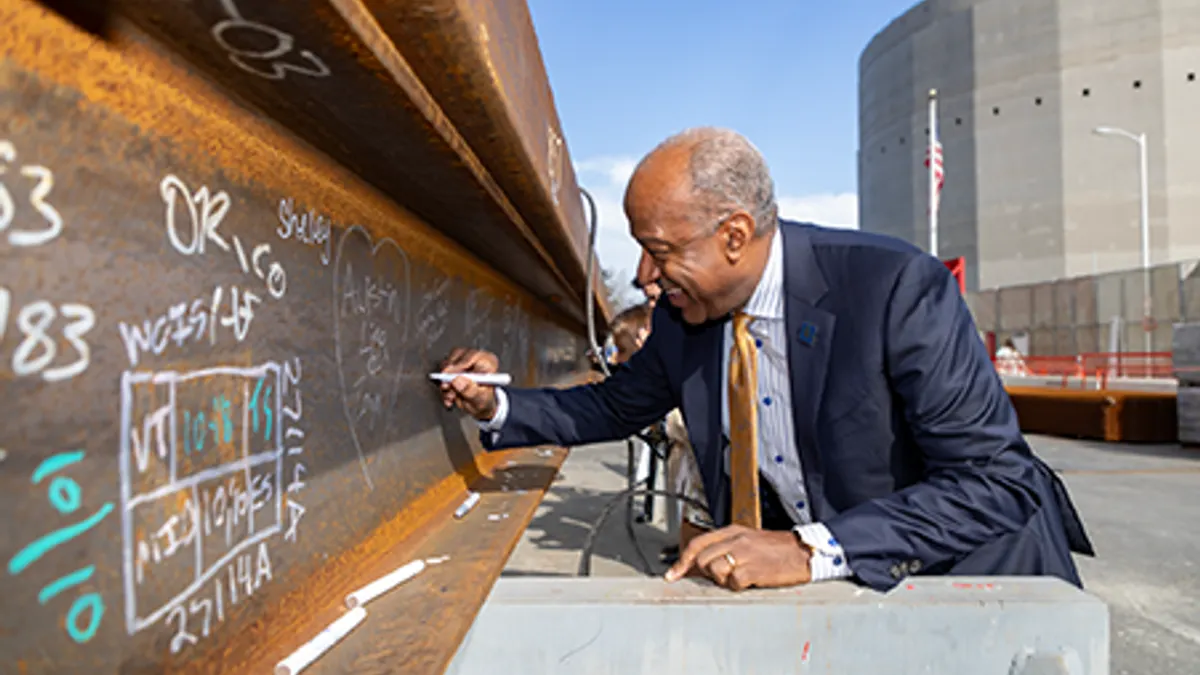The U.S. Department of Transportation has removed sex and race as criteria for automatic certification in its Disadvantaged Business Enterprise program, according to an interim final rule announced Sept. 30 that went into effect on Oct. 3.
“A determination that an individual is socially and economically disadvantaged must not be based in whole or in part on race or sex,” the rule reads. “Being born in a particular country does not, standing alone, mean that a person is necessarily socially and economically disadvantaged.”
The move essentially guts the 45-year-old program, attorneys say, which was first established in 1980 before being enacted into law in 1983 to level the playing field for women- and minority-owned businesses bidding on federal contracts. For construction, along with the Small Business Administration’s 8a program, it has been one of the highest-profile government initiatives to promote non-majority companies in the industry.
The change to the program was issued a little more than a week before the kickoff of Construction Inclusion Week 2025, the industry’s own internally developed initiative to broaden diversity among workers.
This year’s CIW begins Oct. 13 and, in an era when diversity and inclusion has come under fire from President Donald Trump’s administration, organizers say they are emphasizing inclusion for everyone in order to broaden the potential applicant pool for the industry, which faces a severe labor shortage.
DBE certification
Danielle Dietrich, an attorney at Washington, D.C.-based Potomac Law Group, said the rule change means all DBEs will now need to be reconsidered on a case-by-case basis via a personal narrative, without taking sex or race into account.
“It means that all of the DBE goals are currently paused,” Dietrich said. “All of the contracts and overall goals are basically gone until such time as the states reevaluate every single one of their DBEs on a basis that does not take into consideration sex, race or ethnic origin.”
Dietrich noted that for firms that are decertified under the rule, there’s no current avenue to appeal the decision. However, already-signed contracts with DBE stipulations could likely still be enforced.
DOT did not respond to Construction Dive’s requests for comment about the issuance of the new rule.
According to a Biden-era news release on a previous final rule for the program announced in April 2024, there are nearly 50,000 firms certified as DBEs nationally, with another 3,500 in DOT’s similar Airport Concessions DBE program.
While the programs set aspirational goals for participation in federal contracts by women and minorities at the national level, departments of transportation in the states and those in D.C., Puerto Rico and the U.S. Virgin Islands handle the certification of businesses. Each administers a Unified Certification Program that applies to agencies across its jurisdiction. In guidance issued Sept. 30 along with the new rule, DOT said those UCPs must now reevaluate the eligibility of all existing DBEs.
The rule immediately impacts all current DBE and ACDBE firms and future applicants, all of whom will now be required to show their disadvantage on an individual basis, attorney Jacqueline Unger, a partner at law firm PilieroMazza, said in a blog post. Certified firms that can’t show social or economic disadvantage will be decertified.
Though the public can still comment on the rule for 30 days, DOT sidestepped a requirement to seek the public’s input before it issued the rule, Unger noted.
“While agencies generally are required to provide the public with notice of proposed rulemaking and an opportunity to comment prior to publication of a substantive rule, DOT found that an exception applied because continuing to enforce requirements it found unconstitutional would be contrary to the public interest,” Unger wrote.
Since UCP’s are required to review all current DBEs, companies should expect a notice from their state or local agency and be prepared to submit a personal narrative, said Chris Slottee, an attorney at Schwabe in Anchorage, Alaska.
“If they do not respond, it appears that they will be decertified,” Slottee said. He added that going forward, “any efforts to broaden the applicant pool for construction jobs may result in more attention/concern if it is based on race or sex factors, as opposed to economic disadvantage.”
Future challenges
Maureen Sweeney, an attorney in the Pittsburgh office of law firm Steptoe & Johnson, said DOT’s process will likely open it up to further litigation.
“This action by the DOT will likely be challenged for failure to comply with the Administrative Procedure Act,” Sweeney wrote in a blog post. “In the meantime, this new rule becomes effective immediately upon publication in the Federal Register.”
The development follows court rulings last year that found the DBE program’s reliance on a presumptive disadvantage due to race and sex was likely unconstitutional. That determination came in the wake of the 2023 Supreme Court ruling in Students for Fair Admissions v. Harvard that knocked down affirmative action in higher education.
Under Trump, DOT in May decided to settle the case and no longer defend sex or race as qualifiers. A ruling on that settlement is still pending.
Inclusion Week
As certified DBE companies and their attorneys digest the impacts of the new DBE rule, Construction Inclusion Week will unfold on schedule, organizers said.
Programs will include social media blast kits, 13 toolbox talks for workforce development, a workforce directory and tips on implementing events during the week at jobsites. Toolbox Talks will be available in both English and Spanish, organizers said.
Abrar Sheriff, current co-chair of Inclusion Week and president at New York City-based Turner Construction, told Construction Dive in June the initiative is meant to maximize the industry’s efforts to recruit everyone.
“This is a good thing we are doing,” Sheriff said. “We’re bringing more people into the industry. We hope people see that and that we’re doing this for the right reasons.”























